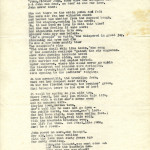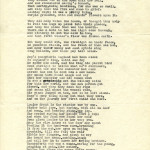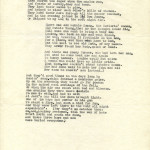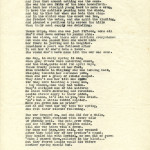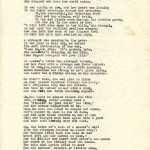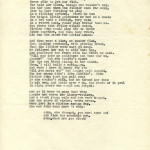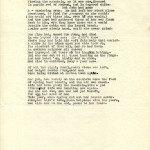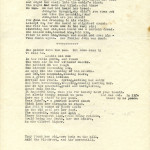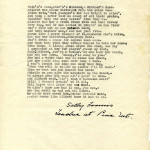Pine Mountain Settlement School
Series 09: BIOGRAPHY – Staff/Personnel
Sarah Marcia Loomis, Staff at PMSS 1929-1931
[“Sally” Loomis]

“Breakfast at Miss Pettit’s Lean-To on Commencement Day.” Dr. Cassleman, Sally Loomis, Harriet [Crutchfield], Margaret [Motter], unk ?, Marian [Kingman], Mrs. Kratz, Mrs. Loomis, Kay Wright, ??. [kingman_075b.jpg]
TAGS: Sarah Marcia Loomis, Sally Loomis, Little Laurel School, English teacher, Wellesley College, Wellesley College News, May D. George, one-room schools, Grenoble France, Medical Settlement at Big Laurel, poetry, Fiddler John Lewis, Louise Lewis, Aunt Louize, Neverstill, George Hanfmann, Appalachian language, Paul Cuffe, Quakers, Harvard Fogg Museum, New Bedford Whaling Museum
SARAH [“SALLY”] MARCIA LOOMIS (b.1905 – d.1985)
Sarah Marcia Loomis, called “Sally,” was a teacher at the Little Laurel school from 1929-31. Little Laurel was a one-room satellite school for the Pine Mountain Settlement School, Harlan County, Kentucky. The remote rural area was a substantial shift for Sally.
Born in 1905, Sally was a native of Elkhart, Indiana, and had been educated early in life in urban schools in Detroit, Michigan, and in Toledo, Ohio. She also spent time in 1923 in a school in Grenoble, France, near the borders of Switzerland and northern Italy.
When Sally came to Pine Mountain, she was 24 and had just graduated from Wellesley College where she distinguished herself as editor of the Wellesley College News (1927-28) and where she had been inducted into the Phi Beta Kappa honorary society.
Education became her life-long career. She stayed for two years at the school in Harlan County, Kentucky. One of the most remote of Pine Mountain’s satellite programs, Little Laurel was approximately five miles from the administrative center at Pine Mountain Settlement School. Teachers at Little Laurel worked out of and lived at the Big Laurel Medical Settlement between Pine Mountain Settlement and the Little Laurel stream and hollow.
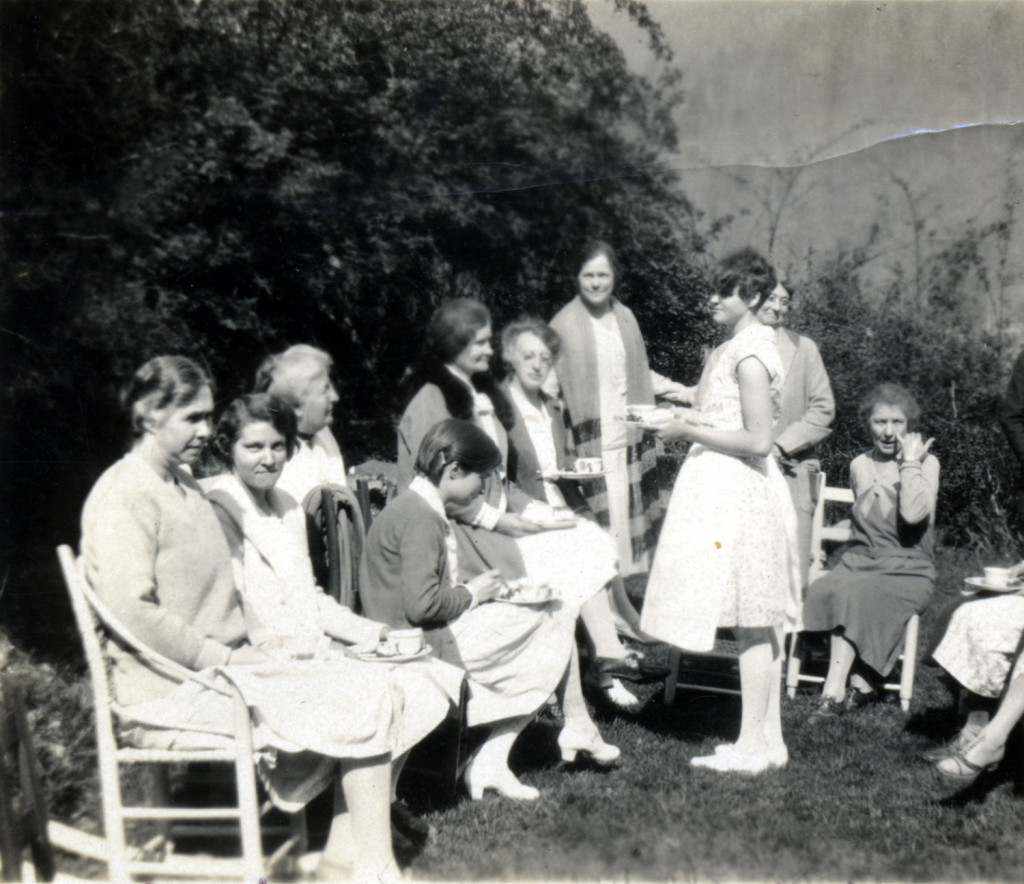
Tea on the lawn at Zande House [Dogwood Breakfast ?], 1930. (l. to r.) Sally Loomis [in front of Dr. Withington ?], a visitor Miss Taylor, Dr. Alfreda Withington, Miss Burbrick, Mrs. Burns, Miss Melville, Mrs. Barti..?., Miss McDavid, Mrs. Bo..?. [X_100_workers_2541.jpg]
SARAH (“SALLY”] MARCIA LOOMIS: After Pine Mountain
Sally left her Pine Mountain appointment after two years in 1931 to continue her education at Radcliffe College where she sought and received an M.A. in English. She then held a variety of teaching positions including secondary schools as well as colleges. She was briefly at the Western College for Women, the University of New Hampshire (1946-47), and last, back to Wellesley, her alma mater, to teach in the English department in 1947.
She showed an early interest in American culture and found time to study for her PhD. in the History of American Culture at the University of Chicago as a student of Percy Boynton (1875-1946), a member of the English Department (1903 – 1941). Boynton is a well-known enthusiast of Appalachian studies and literature. Boynton was a Professor of English at the University of Chicago in 1903 – 1941. He is well-published and received the Chicago Foundation for Literature Award for distinguished service to literature in 1941. Of note is his 1931 The Rediscovery of the American Frontier and 1936 Literature and American Life. In her leter to PMSS, Sally briefly describes her time at Chicago studying for a doctorate [not completed] with the well-known American Literature professor and her own appreciation for early American literature.
In her letter to Pine Mountain Sarah notes that Bynton had traveled to Pine Mountain Settlement School in the earliest days of its creation where he met Uncle William who was in the process of preparing the deed for the School. Boynton was, no doubt, a strong influence on Loomis’s later education and her skill as a writer. [See Loomis poem Neverstill.]

loomis_sally_029

loomis_sally_029a Sarah “Sally” Loomis Letter to PMSS 1939.
Though her preliminary exams were completed, she never obtained her degree from Chicago but continued her pursuit of knowledge with the Fogg Museum at Harvard UNiversity.
In 1957 she took a position with the Fogg Museum of Harvard University where she worked with noted archaeologist George Hanfmann as the administrative and financial secretary for the Harvard-Cornell Archaeological Exploration of Sardis under Professor George Hanfmann‘s field direction. She remained in this position until her retirement in 1967 when she returned to Cambridge. While in retirement in Cambridge she returned to her American culture studies and pursued research for a book about the African American Quaker merchant, sea captain, and trader, Paul Cuffe (1759-1817), who lived in Westport, Massachusetts. Cuffe has recently garnered interest among scholars for his early work to return freed blacks to Africa, later called the Back to Africa Movement. Cuffe managed to establish a colony in Sierra Leone that began the difficult process of emigration of blacks to the colony. Sally Loomis died in February 1985 before she was able to complete her research and her book on Cuffe. Her papers related to her research on Cuffe were given to the New Bedford Whaling Museum Archives Library where Loomis’ work contributes to the early history of the slave trade and to the remarkable life of Paul Cuffe (1759-1817).
THE LESSONS OF PINE MOUNTAIN
Sally never forgot her formative experiences teaching children in a one-room school in the Kentucky mountains, living at Pine Mountain Settlement School’s medical extension at Big Laurel, and later assisting the staff on the PMSS campus. She corresponded with the School regularly, keeping in touch with the latest news and sending donations. She wrote in one of her letters that, “…my heart is there still.” In another letter, she recommends her aunt, Miss May D. George, as a qualified music teacher and tutor for PMSS. Miss May George was subsequently hired by Pine Mountain school for a brief time.
In 1933, Sally was teaching at a school in New London, Connecticut. While there she arranged for an exchange of correspondence between PMSS students and her students at the New London school. She continued her interest in Pine Mountain throughout the years following her departure from Pine Mountain. She gave many talks and programs about the School, raising awareness of its mission and encouraging donations. (For images and a list of contents of her letters with Pine Mountain staff, see SARAH MARCIA LOOMIS Correspondence.)
THE POETRY OF SARAH “SALLY” MARCIA LOOMIS
Sally Loomis’s life was one that quite clearly reflects her interest in social justice, her concern for the poor and disadvantaged, and her devotion to crafting reliable history and to the craft of journalism. Her strong social justice interests can be found in her poetry and especially in her poem “Neverstill” [see below] a rich word tapestry of Appalachian influences woven through with the later themes of her life lessons.
The title of her poem “Neverstill,” is inspired by the Appalachian quaking fern of the same name. It follows the rich themes and moods found in many mountain ballads and especially evokes the fatalism found in much of the favored balladry of the region. The poignant poem “Neverstill” is based on histories gathered from residents in the Pine Mountain community and particularly, the well-known family of Fiddler John Lewis. The fatalism of the poem like that expressed by Aunt Louize Lewis, Fiddler John’s wife, is found reflected in many of the somber and sometimes brutal ballads popular in the culture of the Southern Appalachians. Sally Loomis dipped into this trope and wove it into the real-life experiences of Louize and her husband Fiddler John. It is the John Lewis familiy’s well-known history and the couple’s often-quoted conversations that form the context of the poem. Loomis’s first-hand experiences with the Lewis family and other surrounding families also informed many of her later endeavors.
While working at the Little Laurel School she developed deeply rich and lasting relationships with many of the families and it is those families that helped to shape her later interest in history, particularly early American history, and anthropology. All these regional influences are woven into her powerful poem, “Neverstill.”

Katherine True Album: “Uncle Fiddler John and Aunt Louise.” [pmss_tru100.jpg]
While reading this narrative poem, it’s not difficult to imagine sitting on the cabin porch of Aunt Louize and Fiddler John as they shared their life stories. The couple was a favorite with Pine Mountain workers and the Lewis home warmly welcomed all who visited to come and “sit a spell.”
![Fiddling John Lewis and his wife, Louize. [lave017.jpg]](https://pinemountainsettlement.net/wp-content/uploads/2013/12/lave017-300x194.jpg)
Fiddling John Lewis and his wife, Louize. [lave017.jpg]
Gallery: “Neverstill” and “The Dead Child” Poems
- Sally Loomis, Neverstill. [loomis_neverstill_001.jpg]
- Sally Loomis, Neverstill. [loomis_neverstill_002.jpg]
- Sally Loomis, Neverstill. [loomis_neverstill_003.jpg]
- Sally Loomis, Neverstill. [loomis_neverstill_004.jpg]
- Sally Loomis, Neverstill. [loomis_neverstill_005.jpg]
- Sally Loomis, Neverstill. [loomis_neverstill_006.jpg]
- Sally Loomis, Neverstill. [loomis_neverstill_007.jpg]
- Sally Loomis, Neverstill. [loomis_neverstill_008.jpg]
- Sally Loomis, Neverstill. [loomis_neverstill_009.jpg]
- Sally Loomis, Neverstill. [loomis_neverstill_010.jpg]
TRANSCRIPTION: “Neverstill” and “The Dead Child” Poems
NEVERSTILL
Aunt Louize edged her chair to the door and the sun.
”John, Fiddler John, come view the mountain now!”
But John was deaf, as deaf as she was lame.
John never came.
She sat there on the cabin porch and felt
The warm air fan her withered cheek
And harked the chatter from the dogwood bough,
And the singlng, rushing in the creek,
Oh, it had been so long to wait tills time!
But she was feeling it once more;
Her eightieth spring this one,
Greener than ary one before.
“Hit’s greenin’ up again,” she whispered in great Joy,
Straining old eyes and dim,
To see a new haze gently blur
The mountain’s rim.
“The hills shall skip like lambs,” she sang
Of the mountain scallops ‘gainst the sky engraved.
Anew with gushing torrents laved
Were the mountain sides, and gay
With sarvice and red maples braved.
Under the trees, where she could never go again
The bloodroot and anemone were springing,
And the fronds, tight curled and gray
Were opening to the redbirds’ singing.
Oh the neverstill, the trembling fern,
That set her deepest self astir,
Oh the sun flecked through the beeches’ green,
That brought tears to the eyes of her!
It would be spring on yon side too,
Where Pearl, her only son within this life,
Lived with a child she’d never seen
And an unknown wife..
(Harlan town, Harlan town,
She’d told him he must not go down —
The public works, the mines, can’ t last.
She had been right, they were ending fast.)
Here In this valley, from this soil,
With the mountain brooding over,
was life for them. But Pearl, like John,
Must be a rover.
John roved no more, she thought,
Her old, lean bosom welling
With the love that sixty years ago
Was newly swelling.
John, she thought, you must come out
And view the mountain now.
John, what are you about?
I.
She sat there on the cabin porch, and felt
The warm air fan her withered cheek.
The mountain, looming there, meant all her life.
Almost she had been born right here:
The first she recollected was her second year,
When she came over from yon side.
Spring it was then, spring In its pride.
Mammy was on the mule, piled high with household plunder
With pans and kettles peeping out from under.
And little Marthy sleeping at her breast.
Her pap marched on ahead, a rifle slung
Upon his back, and leading their two cows —
One was part buffalo, the other like a faun*
Aunt Bythie trudged beside, and packed Louize
When she grew tired and needed rest.
They had been walking, so since early dawn.
Louize remembered that she had a duck
She hugged tight to her in her love,
Until she strangled it, and heard Aunt Bythie say
“Low, honey, throw the nasty thing away.”
Under a great flat rock up on the top
She’d left her pet, and cried for quite a mile.
And the singing world sang falsely for a while.
That was the first she knew of death; It was
Her earliest memory. What a thing
To think about, now it was spring!
Except that it was always so —
Just when you held your breath
For beauty, there was death.
II.
The thick, green darkness of the valley then,
Before it had been cleared by men!
They cooked out in the open till the fall,
And she remembered Marthy’s bonnet,
That Marthy, being heedless, for she was so small,
Let slip Into the fire and come to grief.
Louizey wept; it was a pretty thing.
Purple grounded, with red runnin’ flowers upon it.
They all holp raise the house, or thought they holp
To roll the logs up poles into their places,
And tamp the stone that was the hearth.
There was a hole to let the light come through.
And bitterly it let the cold in too.
And that first winter’s floor was frozen earth.
Yet they would sit, the firelight on their faces.
On puncheon stools, and the front of them was hot,
And hear their mammy and Aunt Bythie sing
Song ballads, and their pap tell tales.
Pap’s ancestor In England had been close
To England’s King, until one day
He spoke his mind, and the king, his parrot bird
Went straight to tattle what he’d overheard.
And that was why the ancestor had come
Across the sea to seek him a new home.
Her mammy then would laugh and say
That her ancestor and his woman went
To see a great shlp set its billowy sails
For this new world, and the man person got
Aboard, and when they cast the rope
And ocean all about the vessel rose,
His woman Jumped on too, not to be left alone.
They’d nary thing along but what they wore.
And on the journey her first child she bore.
Louize drank In the stories one by one.
Winter held joys, but spring, with all in leaf
And song, and bearing young, was joy.
The second spring her mother bore a boy;
And when the faun cow found her calf,
‘Twas given Louize to be her very own.
Many the slow hours at the door she spent
Feeding it the hard-won corn, breaking
It from the cob, her eyes on waking
Mountain, till she felt the calf
Nibble her fingers, and about to cry
She heard her mammy, mocking, laugh
And call her in to nurse her crying brother.
Thenceforth she was a woman, caring for the young,
Laughing at pain, like mother.
Taking her place the woman folks among.
III.
There were more valley folk come crowding now,
With their log raisIngs, grubbings stir-offs, where
All worked or played together.
They shared the sugar when the maples ran,
And feasts of turkey, deer and bear.
They lent their mules to plow,
And helped to clear each other’s hills of stones.
They hoed their corn through all the summer weather,
And in the evening Joined in Old Doc Jones,
Or Skipped to my Lou in the soft night air.
There was old Ruthie Young, the doctorin’ woman.
Old Ruthie Young, that no one thought could die,
Till once she went to bring a baby in;
Louize, who took an axe and went ahead,
The nag, breaking it footholds in the ice,
For a piece, and then went home to bed,
Was the last to see old Ruth, of ary human.
They never found her body, quick or dead.
And there was Mossy Turner, who had left her man.
But used to come back now and again
To borry baccer. Louize could not abide
A woman who could have so little pride.
(But then, she couldn’t stand tobacco smoke.
She had done well to make her John and all
Her sons be chewin’ men instead.)
But they’d good times in the days long by
Huntin’ sang, which fetched a handsome price.
Up on the mountain they would go for possum
In the spiced cool evenings of the fall.
Or when the air was sweet with bud and blossom.
One evening they were there too late
To see to walk, and had to wait
At Jack’s Gap till the dawn brought light.
One of the boys had powder in his gun
To start a fire, but shot a bird for fun.
And they were left there in the cold all night
A-punishin’. (For they’d no matches then.
No, not Louizey reckoned, till the war of hate
Twixt north and south was done.
And those three boys and men
Were buried, everyone.)
IV.
That was as lonesome time as ever she had seen,
She was alone up on the mountain when it came.
She heard them beating up the volunteers,
And from that moment nothing was the same.
She was the man folks of the home henceforth.
She bent her straight young back to make a crop,
To have the soldiers passing take the whole.
And try to kiss her when she bade them stop.
And in the winter when the creek was ice,
She fetched the water, and she split the kindling,
And planned a perilous trip across the hills
When their meal supply was dwindling.
Those trips, when she was Just fifteen, were all
She’d ever made across to yonder side.
She was alone, and there were soldiers everywhere:
But when she passed them she would hide
Her fears in Jesting and In laughter.
Sometimes a peart one followed after
To ask her if she’d take a lover.
She vowed she’d have none till the war was over.
One day, in early spring it was,
When gray fronds were uncurling sweet,
And the wind, quite cold for April days.
Threw frosty petals at her feet,
From Crabtrace in Virginny she was turning back,
Stooping beneath her commeal poke,
When she saw a group of rebels camped.
They didn’t see her till she spoke
For they were taunting a young man,
A boy almost, whom they had taken.
They’d stripped him of his uniform;
He stood there shivering and forsaken.
Louize strode angry to their midst,
“It’s a shame, its a sin to you,” she cried.
“He’s but a little rabbit soldier.
Have you grown men no pride?”
And as she went her way into the spring,
She felt their silence following.
The war dragged on, and she did for a while,
Her young back strained with every mile
Of packing meal. The pain grew ever.
And she toiled on with Joyless smile.
Till she was taken with a fever.
For days and days, they said, she swooned
After they told her of her brother’s wound.
They healed him with Ezekiel, as men did of yore:
“When I passed thee, polluted in thy blood …
But they feared Louize would die before
Another spring should bud.
V.
Then after the worry and the war.
When her pap and brother were home once more.
And the fever had cooled in Loulze’s brain,
She stepped out Into the world again.
It was spring as now, and her heart was leaping
At the heavy sweetness around her creeping.
Oh, the neverstill, the trembling fern
That set her singing self astir,
Oh ,the sun flecks seen through the beeches green,
And the Joy in the heart of her.
“I will lift mine eyes to the hills,” she thought,
As her eyes the familiar scallops sought;
And she felt the ends of her fingers itch
To turn the soil that smelled so rich.
A stranger was passing by the gate.
It was good to call out, as before
The dark mistrusting of the war,
“Come in, and stay. It’s growing late.
The sun-ball’s dropping on the hill.
Come in, and rest, and eat your fill.”
At Louize’s words the stranger turned,
And her face with a strange new fever burned.
For It was, yes, surely – the rabbit soldier,
Grown handsome and strong as he’d grown older,
And there was a fiddle strung on his shoulder.
He didn’t know, she was glad to think
AS they passed together through the door,-
He’d forgotten they had met before.
But then he turned to her with a wink.
And she felt her fever mounting higher.
Oh,the tunes he played around the fire
That evening while Louize knit —
For “fiddln’ is just idlin’ the time,”
And her mother disapproved of It.
When he made the songs to mingle and chime,
She’d glance up then to see it done.
And his eyes would twinkle at her in fun
Till she brought hers back again with a Jerk
And bent them sternly over her work.
Oh, the tales he’d tell of a summer’s day!
(For the stranger decided he could stay).
Her brother liked best the tale of how
Grant left Lee his horses to plow, —
For the fiddler had heard from Grant’s own mouth
His words at the victory over the south.
The tale that Marthy liked to hear
Was the Indians’ capture of Fiddler John,
When they most from them that he had to fear l
Was their wanting to keep him on and on —
For they loved his fiddling, as who would not?
And the chief offered him an Indian maid,
Solid gold from the waist, he said,
If he’d stay with them, and share their lot.
And Fiddler John would have none of it,
But was off and away.
And. Louize would sit
Drinking it in, and very still,
Never able to get her fill.
The tale she liked, though she wouldn’t say,
Was the time. when the fiddler went far away,
Over to West Virginny to play
In a fiddling contest. There he won
The bright little goldpiece he had on a chain
On a bet that a fiddler, very vain
In a velvet coat, could play better than he.
But where that fellow single noted.
Fiddler John could play two or three
Notes together, and when they voted,
His was the prize for Little Mohee.
And then came a time, as summer fled,
When Louize reckoned, with growing dread.
That the fiddler soon must go away.
He followed her out to milk that day,
And confirmed her fears with the first he said.
“will you take my goldpiece and wear for me,
Louize?” But she couldn’t speak
For the hot blood rising in her cheek.
Then, I will build a cabin, Lou,
And when I have it ready for you
Will you marry me?” But Louize said nought.
For her mammy didn’t like fiddlln’. Then
Fiddler John took the pail away
So she couldn’t milk, and he turned her face
To his own, and their eyes – oh, the sweet of It yet!
In sixty years she could not forget.
And so it came to pass that when
Louize had woven her linsey-woolsey,
And a stout young mule and cow were bought,
And the snows of winter, every trace,
Were lost in a riotous spring day,
She and John came here to stay.
John, she thought, you must come out
And view the mountain now,
John, what are you about?
VI.
Spring again! So many she had sat
Here in the door-way, with a least ‘un at her breast,
Singing her child to sleep toward night.
Viewing the mountain, as it was now, dressed
In purple red of redbud, and in dogwood white.
But John had gone
A-wandering ever. He had left her stark alone
Sometimes, to fend for younguns as she could.
(She could not blame him, even if she would.)
And the Lord had gathered three of her own flesh
Back to Him, ere they knew there was a world
Outside the cabin and the laurel bresh.
Louize grew slowly hard, until she never cried.
One fine lad, named for John, had died
In war beyond the sea. She didn’t know
Where they had laid his soft fair hair that curled.
A slide in the mines upon yon side took Jo,
The stoutest of them all, her Jo had been.
An unknown neighbor all unseen
Had lay-wayed Sol there at the logging bridge, —
Sol who was out at all times hunting on the ridge.
And her least ‘un, kindly and so slow,
Had died in childbed, many a year ago.
Of all the eight, Pearl, Pearl alone was left,
And Sal, at Gander Fork, said men
Were being killed at Harlan town again.
And yet, how lovely on the mountain were the feet
Of spring that cometh, and the air was sweet.
Life had been good; the mountain, like a god
Within her life was bursting new again.
She was not old, she was not yet bereft,
For one had need of her
This year, when spring set all her depths astir.
John, her life’s love, grown helpless with the years,
Was with her to the end, peace to her fears.
VII.
Above the cabin roof the sun stood high, –
She must go in and mix him up some bread.
On the brightness and the song she turned her back
And edged her chair into the cabin’s black.
The light had made her blind … But there
He was. He had not heard her tread.
John, she thought, why didn’t you come out
And view the mountain, John?
John,what are you about?
For John was drooping in his chair. Asleep?
No, for she heard no slightest sound.
She felt the truth now in the very air;
Clutching her old, lean bosom was a certain dread.
She called him, touched him, felt him,
Tried to move him, though she could not move him —
Twas death again. Her Fiddler John was dead.
She passed into the sun. Yet none came by
To call to.
Louize sat now
In the cabin porch, and found
The warm air on her withered cheeks.
The catbird on the bough
Was hideous screaming now.
An ugly din the rushing of the creeks.
And God, the mountain, looming there,
Was a great wall between
Herself and Pearl.
Spring, setting her astir
Had been bewitching, trapping, cruelly mocking her.
And. so the mountain, great and hard, serene,
Meant only death.
It happened thus, when you for beauty held your breath.
But slowly beauty ceased, to pain
And was not.
In life there is no peace.
Here was a staff to her hand.
‘Twas John’s, — a gnarled laurel shoot
Which lent her strength to stand.
She felt a surge of youth again
As the old path met her foot.
The mountain, which had lain
There throughout time, would bring release,
Would bring her death, her one desire,
As she climbed higher.
They found her old, worn body on the hill,
Amid the bloodroot, and the neverstill.
Sally Loomis [Sarah Marcia Loomis]
In the second poem left at the School by Sally Loomis, the atmosphere is even more somber and ominous. The poem tells the story of the death of a young child who, it would seem, saw her own death coming.
The Dead Child.
This ‘n’s Cleo, this ‘n’s Mildred, — Mildred’s dead.
Mildred was allus different from the other two.
Folks said, “That youngun’s far too bright to raise.”
But then I never took no count of all their praise.
ThinkIn’ they was only talkin’ like they do,
Mildred had her a fresh dress from out that drawer
Ever day, and If she soiled It playin’ on the floor
She’d fold hit up and put hit back,
And take another one, — and her just five.
Seems like I never thought of it. whenever she’s alive.
But she was different, everybody said.
She’d fetch a chair for anyone that come.
And when they went they always begged to take her home with them.
A little piece afore she died, one day
I quarreled at her for playin’ round my feet,
Said, “Mildred, you’re a bother.” So she took her chair.
And sot her down. “Mammy, I’ll sing to you.”
She had a voice that was so clear and sweet,
And she could sing most ever song I knew.
I can’t forget the song she sang that day,
“When the roll Is called up yonder, I’ll be thar.”
Then we went out and heared the train
Whistle on yon side the mountain on the track,-
We always year hit when hit’s goin’ to rain.
And Mildred said, “Ain’t that a”lonesome call?”
Still I thought nothin’ of it all,
Till three days later she was dead.
We didn’t know how bad it was, you see, —
Her leg swoll up and got all black.
He could have saved her, Doctor Metcalf said,
… But seems like Mildred knew it had to be.
Sally Loomis
THE PHOTOGRAPHS OF SARAH “SALLY” MARCIA LOOMIS
In addition to her talent for capturing the history and sentiments of her neighbors, Sally was a skilled photographer. See SARAH MARCIA LOOMIS PHOTOGRAPHS
See Also:
SARAH MARCIA LOOMIS PHOTOGRAPHS
SARAH MARCIA LOOMIS Correspondence
FIDDLER JOHN LEWIS and Aunt Louize
|
Title |
SARAH MARCIA LOOMIS |
|
Alt. Title |
“Sally” Loomis ; “Sallie” Loomis ; |
|
Identifier |
Permalink: https://pinemountainsettlement.net/?page_id=9397 |
|
Creator |
Pine Mountain Settlement School, Pine Mountain, KY |
|
Alt. Creator |
Ann Angel Eberhardt ; Helen Hayes Wykle ; |
|
Subject Keyword |
Sarah “Sally” Marcia Loomis ; Sally Loomis ; Pine Mountain Settlement School ; teachers ; Little Laurel school ; satellite schools ; Wellesley College ; Wellesley College News ; Phi Beta Kappa ; May D. George ; education ; Big Laurel Medical Settlement ; Radcliffe College ; Western College for Women ; University of New Hampshire ; University of Chicago ; Fogg Museum ; Harvard University ; archaeologists ; George Hanfmann ; Harvard-Cornell Archaeological Exploration of Sardis ; secretaries ; American culture studies ; Paul Cuffe ; Back to Africa Movement ; New Bedford Whaling Museum Archives Library ; social justice ; journalism ; Neverstill ; mountain ballads ; poetry ; Pine Mountain community ; Fiddler John Lewis ; Aunt Louise Lewis ; The Dead Child ; Harlan County, KY ; Elkhart, IN ; Detroit, MI ; Toledo, OH ; Grenoble, France ; Chicago, IL ; Cambridge, MA ; Westport, MA ; Sierra Leone, Africa ; New Bedford, MA ; Oxford, OH ; Durham, NH ; |
|
Subject LCSH |
Loomis, Sarah Marcia, — 1905 – 1985. |
|
Date |
Date digital: 2014-04-28 hw |
|
Publisher |
Pine Mountain Settlement School, Pine Mountain, KY |
|
Contributor |
n/a |
|
Type |
Collections ; text ; image ; |
|
Format |
Original and copies of documents and correspondence in file folders in the Annex filing cabinet ; Series 09: Biography – Staff/Personnel |
|
Source |
Series 09: Biography – Staff/Personnel |
|
Language |
English |
|
Relation |
Is related to: Pine Mountain Settlement School Collections, Series 09: Biography – Staff/Personnel , Fiddler John Lewis ; |
|
Coverage Temporal |
1905 – 1985 |
|
Coverage Spatial |
Pine Mountain, KY ; Harlan County, KY ; Elkhart, IN ; Detroit, MI ; Toledo, OH ; Grenoble, France ; Chicago, IL ; Cambridge, MA ; Westport, MA ; Sierra Leone, Africa ; New Bedford, MA ; Wellesley, MA ; |
|
Rights |
Any display, publication, or public use must credit the Pine Mountain Settlement School. Copyright is retained by the creators of certain items in the collection, or their descendants, as stipulated by United States copyright law. |
|
Donor |
n/a |
|
Description |
Core documents, correspondence, writings, and administrative papers about Sarah Marcia “Sally” Loomis ; |
|
Acquisition |
n/d |
|
Citation |
Pine Mountain Settlement School Institutional Papers, Pine Mountain Settlement School, Pine Mountain, KY |
|
Processed By |
Helen Hayes Wykle ; Ann Angel Eberhardt ; |
|
Last Updated |
2014-04-28 hhw ; 2015-06-05 aae ; 2020-08-28 hhw (correspondence) ; 2024-10-21 hhw ; 2024-11-07 hhw ; |
|
Bibliography |
Sources Sarah Loomis Papers.1965-1985 |
Return to BIOGRAPHY – A-Z

